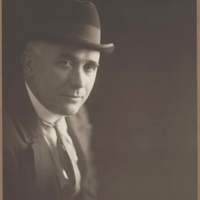Peter Simson’s Farm
Simson settled in the timber when his arm was strong and true,
And his form was straight and limber; and he wrought the long day through
In a struggle, single-handed, and the trees fell slowly back,
Twenty thousand giants banded ’gainst a solitary jack.
Through the fiercest days of summer you might hear his keen axe ring
And re-echo in the ranges, hear his twanging crosscut sing;
There the great gums swayed and whispered, and the birds were skyward blown,
As the circling hills saluted o’er a bush king overthrown.
Clearing, grubbing, in the gloaming, strong in faith the man descried
Heifers sleek and horses roaming in his paddocks green and wide,
Heard a myriad corn-blades rustle in the breeze’s soft caress,
And in every thew and muscle felt a joyous mightiness.
So he felled the stubborn forest, hacked and hewed with tireless might,
And a conqueror’s peace went with him to his fern-strewn bunk at night:
Forth he strode next morn, delighting in the duty to be done,
Whistling shrilly to the magpies trilling carols to the sun.
Back the clustered scrub was driven, and the sun fell on the lands,
And the mighty stumps were riven ’tween his bare, brown, corded hands.
One time flooded, sometimes parching, still he did the work of ten,
And his dog-leg fence went marching up the hills and down again.
By the stony creek, whose tiny streams slid o’er the sunken boles
To their secret, silent meetings in the shaded waterholes,
Soon a garden flourished bravely, gemmed with flowers, and cool and green,
While about the hut a busy little wife was always seen.
Came a day at length when, gazing down the paddock from his door,
Simson saw his horses grazing where the bush was long before,
And he heard the joyous prattle of his children on the rocks,
And the lowing of the cattle, and the crowing of the cocks.
There was butter for the market, there was fruit upon the trees,
There were eggs, potatoes, bacon, and a tidy lot of cheese;
Still the struggle was not ended with the timber and the scrub,
For the mortgage is the toughest stump the settler has to grub.
But the boys grew big and bolder—one, a sturdy, brown-faced lad,
With his axe upon his shoulder, loved to go to work ‘like dad’,
And another in the saddle took a bush-bred native’s pride,
And he boasted he could straddle any nag his dad could ride.
Though the work went on and prospered there was still hard work to do;
There were floods, and droughts, and bush-fires, and a touch of pleuro too;
But they laboured, and the future held no prospect to alarm—
All the settlers said: ‘They’re stickers up at Peter Simson’s farm.’
One fine evening Pete was resting in the hush of coming night,
When his boys came in from nesting with a clamorous delight;
Each displayed a tiny rabbit, and the farmer eyed them o’er,—
Then he stamped—it was his habit—and he smote his knee and swore.
Two years later Simson’s paddock showed dust-coloured, almost bare,
And too lean for hope of profit were the cows that pastured there;
And the man looked ten years older. Like the tracks about the place,
Made by half a million rabbits, were the lines on Simson’s face.
As he fought the bush when younger, Simson stripped and fought again,
Fought the devastating hunger of the plague with might and main,
Neither moping nor despairing, hoping still that times would mend,
Stubborn-browed and sternly facing all the trouble Fate could send.
One poor chicken to the acre Simson’s land will carry now.
Starved, the locusts have departed; rust is thick upon the plough;
It is vain to think of cattle, or to try to raise a crop,
For the farmer has gone under, and the rabbits are on top.
So the strong, true man who wrested from the bush a homestead fair
By the rabbits has been bested; yet he does not know despair—
Though begirt with desolation, though in trouble and in debt,
Though his foes pass numeration, Peter Simson’s fighting yet!
He is old too soon and failing, but he’s game to start anew,
And he tells his hopeless neighbours ‘what the Gov’mint’s goin’ to do’.
Both his girls are in the city, seeking places with the rest,
And his boys are tracking fortune in the melancholy West.

